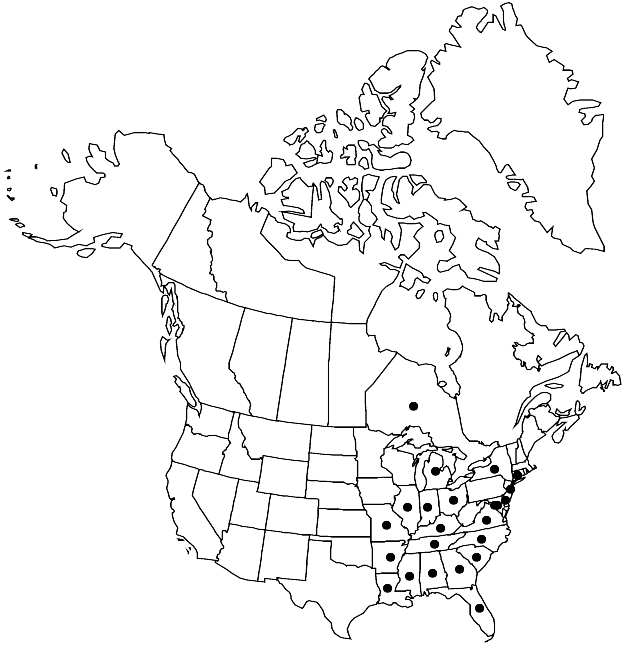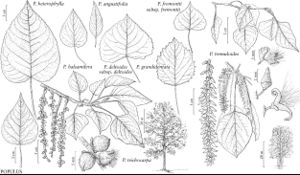Populus heterophylla
Sp. Pl. 2: 1034. 1753.
Plants to 28 m, 12 dm diam.; not obviously heterophyllous. Bark reddish-brown to brownish gray, deeply furrowed. Branchlets reddish-brown, becoming grayish by third year, round to 5-angled, 3–6 mm diam., very coarse, thinly tomentose to glabrate. Winter buds reddish-brown, pubescent, slightly resinous; terminal buds 4–7 mm; flowering buds separated on branchlets, 4–7 mm. Leaves: petiole round distally, (1–) 4–8 (–12) cm, 1/2 blade length, (tomentose to glabrate); blade ovate, (3.5–) 9–20 (–24) × (3.5–) 7.5–12.5 (–19) cm, w/l = 2/3–3/4, base deeply cordate to subsagittate, basilaminar glands 0 or 2, round, margins not translucent, not ciliate, apex obtuse to apiculate, abaxial surface pale green, pubescent to partly glabrate, retaining tomentum at least basally and on midvein, adaxial dark green, glabrous; preformed and neoformed blade margins finely and unevenly crenate-serrate throughout, teeth 30–60 on each side, sinuses 0.3–1 mm deep. Catkins sparsely 10–15 (–45) -flowered, 4.5–8 (–18 in fruit) cm; floral bract apex deeply cut, not ciliate (pubescent abaxially). Pedicels (1–) 5–10 (–18 in fruit) mm. Flowers: discs (caducous), cupshaped, not obviously oblique, toothed, 1.5–2.5 (–4) mm diam.; stamens 15–35; anthers apiculate; ovary 3-carpelled, ovoid to spherical; stigmas 2–4, convoluted, expanded, erect. Capsules ovoid, 8–14 mm, glabrous, 3-valved. Seeds 6–9 per placenta.
Phenology: Flowering Apr; fruiting May–Jun.
Habitat: Nyssa-Taxodium swamps, drainage ditches, natural and artificial wet depressions, coastal plains, central lowlands, piedmont along major streams
Elevation: 0-200(-400) m
Distribution

Ont., Ala., Ark., Conn., Del., D.C., Fla., Ga., Ill., Ind., Ky., La., Md., Mich., Miss., Mo., N.J., N.Y., N.C., Ohio, S.C., Tenn., Va.
Discussion
Populus heterophylla is widespread and uncommon in most of its range, which is entirely included within that of P. deltoides. Reports of swamp poplars from upland habitats are based on misidentified sucker shoots of P. grandidentata. Hybrids of P. heterophylla and P. deltoides are found in disturbed habitats, such as drainage ditches. Hybrids have glabrous leaves more elongate than those of P. deltoides.
Selected References
None.
